27 Apr 2010
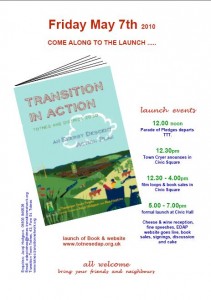 The long awaited launch of the Totnes and District Energy Descent Action Plan will take place on Friday 7th May 2010 in the centre of town. Over the next few days I will be posting more about the Plan, a labour of love for the last year and a half, which has emerged as a quite extraordinary piece of work. You can now pre-order copies here. The official launch of the Plan will be on Friday May 7th, the day after the Election. Shoppers at the Friday market will be given some tasters of energy descent in colourful and musical spectacle as a parade of enthusiasts carrying pledges weave their way from TTT’s office in Fore Street up to the market and through the stalls at noon. The book will be on sale and a film loop of how the EDAP was created will be on show in adjoining venues during the afternoon. At 5pm there will be a formal launch with local advocates, book signing and cutting the cake in Totnes Civic Hall. All are welcome. Keep up with developments here.
The long awaited launch of the Totnes and District Energy Descent Action Plan will take place on Friday 7th May 2010 in the centre of town. Over the next few days I will be posting more about the Plan, a labour of love for the last year and a half, which has emerged as a quite extraordinary piece of work. You can now pre-order copies here. The official launch of the Plan will be on Friday May 7th, the day after the Election. Shoppers at the Friday market will be given some tasters of energy descent in colourful and musical spectacle as a parade of enthusiasts carrying pledges weave their way from TTT’s office in Fore Street up to the market and through the stalls at noon. The book will be on sale and a film loop of how the EDAP was created will be on show in adjoining venues during the afternoon. At 5pm there will be a formal launch with local advocates, book signing and cutting the cake in Totnes Civic Hall. All are welcome. Keep up with developments here.
Read more»
23 Mar 2010
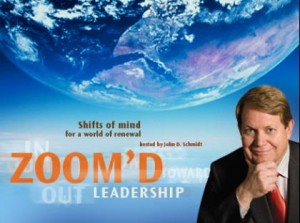 I recently did an interview for the radio show Zoom’d Leadership with John D. Schmidt on the Voice America Talk Radio Network. It was very enjoyable, and I think the final result turned out well. You can hear it here, and download the podcast also.
I recently did an interview for the radio show Zoom’d Leadership with John D. Schmidt on the Voice America Talk Radio Network. It was very enjoyable, and I think the final result turned out well. You can hear it here, and download the podcast also.
Read more»
12 Mar 2010
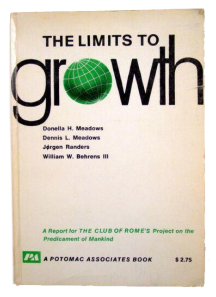
A fabulous piece by Richard Heinberg. Great to read him being optimistic, well. in a Heinbergy kind of way. I also read this piece as an early, brief version of the history of the peak oil/relocalisation/Transition movement that someone will inevitably write one day…. One correction though, ‘Transition Handbook’ wasn’t my PhD, unfortunely I am still flogging away at that!!
What if the economy doesn’t recover? (From Post Carbon Institute)
In 2008 the U.S. economy tripped down a steep, rocky slope. Employment levels plummeted; so did purchases of autos and other consumer goods. Property values crashed; foreclosure and bankruptcy rates bled. For states, counties, cities, and towns; for manufacturers, retailers, and middle- and low-income families, the consequences were—and continue to be—catastrophic. Other nations were soon caught up in the undertow.
Read more»
22 Feb 2010
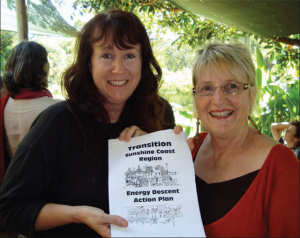
Sonya Wallace (L) and Janet Millington with the Sunshine Coast Energy Descent Action Plan.
Transition Sunshine Coast is very pleased to announce they have delivered their Energy Descent Action Plan (EDAP) to the Sunshine Coast Regional Council. The Sunshine Coast EDAP covers the entire region of the Sunshine Coast located in Queensland, Australia which has a population of 330,000+ and covers an area of more than 3100 square km.
Read more»
15 Jan 2010
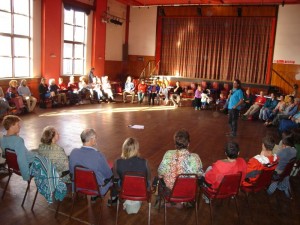 I read with interest John Michael Greer’s recent post, The Costs of Community, and then Sharon Astyk’s response, On the Problem of Community and I wanted to add some thoughts to the flow. Here is a very quick summary of the debate thus far… Greer’s basic argument is that the way politics used to work was that citizens formed themselves into groups and those groups into movements and that was what brought the pressure to bear to make things happen. Today, we are so atomised and isolated that this doesn’t happen, due, in part, to our preciously-guarded sense of autonomy, our lack of time, and our lack of enthusiasm for putting in the work that actually building communities entails. Rebuilding community, he argues, “requires “sacrificing some of the autonomy so many Americans guard jealously”.
I read with interest John Michael Greer’s recent post, The Costs of Community, and then Sharon Astyk’s response, On the Problem of Community and I wanted to add some thoughts to the flow. Here is a very quick summary of the debate thus far… Greer’s basic argument is that the way politics used to work was that citizens formed themselves into groups and those groups into movements and that was what brought the pressure to bear to make things happen. Today, we are so atomised and isolated that this doesn’t happen, due, in part, to our preciously-guarded sense of autonomy, our lack of time, and our lack of enthusiasm for putting in the work that actually building communities entails. Rebuilding community, he argues, “requires “sacrificing some of the autonomy so many Americans guard jealously”.
Read more»
 The long awaited launch of the Totnes and District Energy Descent Action Plan will take place on Friday 7th May 2010 in the centre of town. Over the next few days I will be posting more about the Plan, a labour of love for the last year and a half, which has emerged as a quite extraordinary piece of work. You can now pre-order copies here. The official launch of the Plan will be on Friday May 7th, the day after the Election. Shoppers at the Friday market will be given some tasters of energy descent in colourful and musical spectacle as a parade of enthusiasts carrying pledges weave their way from TTT’s office in Fore Street up to the market and through the stalls at noon. The book will be on sale and a film loop of how the EDAP was created will be on show in adjoining venues during the afternoon. At 5pm there will be a formal launch with local advocates, book signing and cutting the cake in Totnes Civic Hall. All are welcome. Keep up with developments here.
The long awaited launch of the Totnes and District Energy Descent Action Plan will take place on Friday 7th May 2010 in the centre of town. Over the next few days I will be posting more about the Plan, a labour of love for the last year and a half, which has emerged as a quite extraordinary piece of work. You can now pre-order copies here. The official launch of the Plan will be on Friday May 7th, the day after the Election. Shoppers at the Friday market will be given some tasters of energy descent in colourful and musical spectacle as a parade of enthusiasts carrying pledges weave their way from TTT’s office in Fore Street up to the market and through the stalls at noon. The book will be on sale and a film loop of how the EDAP was created will be on show in adjoining venues during the afternoon. At 5pm there will be a formal launch with local advocates, book signing and cutting the cake in Totnes Civic Hall. All are welcome. Keep up with developments here.




